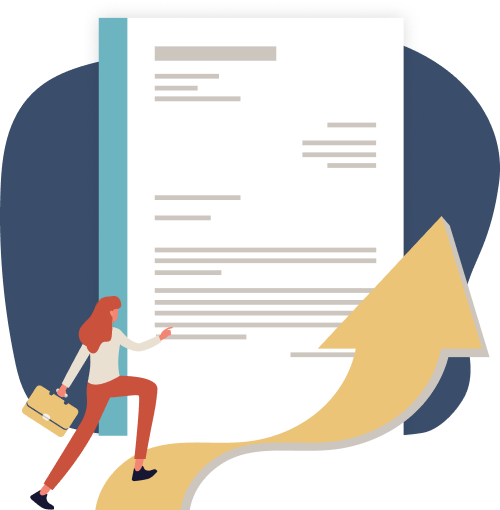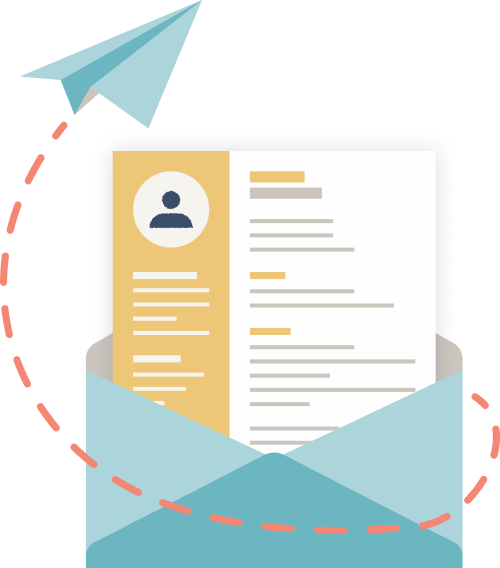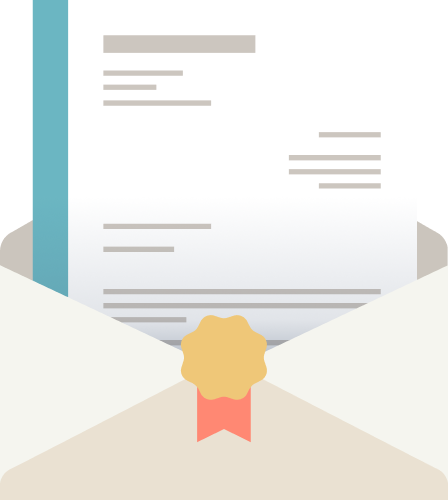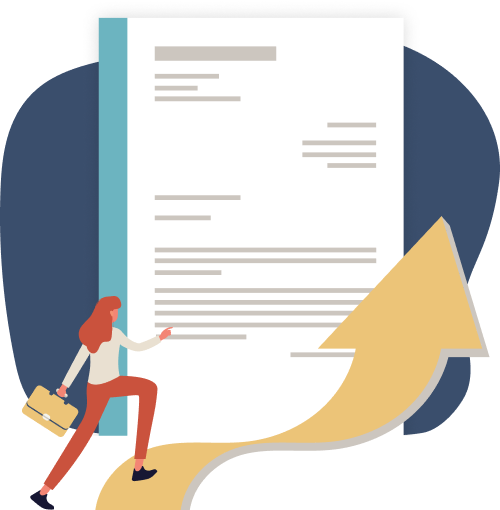Reference Letter Sample, Template & How to Write One
This guide makes writing a reference letter for someone quick and stress-free. We’ll show you how to write a reference letter, what to include, and provide editable reference letter templates you can copy and edit. You’ll also find reference letter samples to help you get the wording right.


Our customers have been hired by: *Foot Note
What is a reference letter?
A reference letter, also known as a letter of recommendation, is a formal document that provides insight into someone’s skills, character, and work ethic. It’s typically written by someone who has worked with the person in a professional or academic setting, such as an employer, manager, teacher, or mentor.
In the workplace, employers often write letters of reference to help former employees secure a new position or promotion. These letters usually describe the individual’s role, responsibilities, strengths, and suitability for future opportunities.
You will typically write a reference letter for:
- A former employee applying for a new job (employment reference letter)
- A student applying to university
Types of reference letters
Reference letters come in various forms, each serving a different purpose depending on the context. Understanding the types can help you request or write the correct letter.
- Employee reference letter: This is the most common type and is usually written by a current or former employer. It focuses on your job performance, skills, and contributions. Also called a job reference letter or work reference letter, it confirms your role and work history. Often used in a job application along with a cover letter.
- Character reference letter: Sometimes needed for situations outside work, such as volunteering or legal matters, this letter highlights your personal qualities like honesty, reliability, and integrity. An employee character reference letter combines both job-related and personal traits.
Academic reference letter: Written by a teacher or professor, this letter supports applications for further study or scholarships by describing your academic achievements and potential. Often used alongside an academic cover letter.
Reference letter samples
Below are a few reference letter samples you can use as templates when writing a job reference for a current or former employee. Each example includes the typical structure and tone expected in a professional reference.

Basic employment reference letter sample
To Whom It May Concern,
I am writing to recommend [Employee’s Full Name], who worked with us at [Company Name] as a [Job Title] from [Start Date] to [End Date].
During this time, [Employee’s First Name] consistently demonstrated professionalism, reliability, and a strong work ethic. They were responsible for [brief overview of duties], and always approached their role with dedication and a positive attitude.
[Employee’s First Name] was well-liked by colleagues and made a valuable contribution to our team. I am confident they will be an asset in any future role.
Please do not hesitate to contact me if you require any additional information.
Sincerely,
[Your Name]
[Job Title]
[Company Name]
[Email / Phone Number]
Character reference letter example
To Whom It May Concern,
I am writing to provide a character reference for [Full Name], whom I have known personally for [X years]. In that time, I’ve found them to be honest, respectful, and consistently reliable in both social and professional settings.
[Name] is someone who treats others with kindness, communicates thoughtfully, and takes responsibility for their actions. They are calm under pressure, supportive of those around them, and act with integrity in all areas of life.
I have every confidence in [Name] and believe they would be a positive influence in any working environment. Please do not hesitate to contact me if you require any additional information.
Sincerely,
[Your Name]
[Relationship to Person – e.g. Family Friend, Neighbour, Mentor]
[Contact Information]
Reference letter example for a former intern
To Whom It May Concern,
I am pleased to recommend [Intern’s Full Name], who completed an internship with us at [Company Name] as a [Internship Title] from [Start Date] to [End Date].
During their time here, [Intern’s Name] showed excellent initiative, a willingness to learn, and a strong grasp of [mention relevant skills or tools]. They contributed meaningfully to [mention project or responsibility] and impressed the team with their professionalism and enthusiasm.
I believe [Intern’s Name] has great potential and would be a valuable addition to any team.
Best regards,
[Your Name]
[Job Title]
[Company Name]
[Email / Phone Number]
Reference letter for part-time employee
Dear [Hiring Manager / To Whom It May Concern],
I am writing to provide a reference for [Employee’s Full Name], who worked for us on a part-time basis as a [Job Title] from [Start Date] to [End Date].
Despite working reduced hours, [Employee’s First Name] consistently delivered high-quality work and maintained a reliable and positive presence on the team. They handled [mention specific responsibilities] and often exceeded expectations.
I confidently recommend [Employee’s Name] for future employment and would be happy to answer any further questions.
Sincerely,
[Your Name]
[Job Title]
[Contact Details]
Reference letter sample for a promotion
To Whom It May Concern,
I am writing to recommend [Employee’s Name] for a promotion or more senior position. As [their manager/supervisor] at [Company Name], I’ve seen firsthand the value they bring to our organisation.
In their current role as [Job Title], [Employee’s Name] has consistently gone above and beyond expectations. They’ve led key projects, mentored junior staff, and demonstrated excellent leadership and communication skills.
I have no doubt [Employee’s Name] will thrive in a more senior role and continue to make a positive impact.
Best regards,
[Your Name]
[Job Title]
[Contact Info]
General Employee Reference (Short)
To Whom It May Concern,
I highly recommend [Employee’s Name], who worked with us at [Company Name] as a [Job Title] from [Start Date] to [End Date].
They were reliable, hardworking, and made a positive contribution to the team. I’m confident they’ll bring the same qualities to their next role.
Regards,
[Your Name]
[Job Title]
Sample reference letter template
[Referee’s Name]
[Job Title]
[Company/Organisation]
[Address]
[Date]
To whom it may concern,
I am pleased to write this reference for [Your Name]. I have known [Your Name] for [length of time] in my capacity as [referee’s role]. During this time, I have observed their excellent skills in [key skills], as well as a strong commitment to [related qualities or achievements].
One example that stands out is when [brief specific example]. This demonstrated [positive outcome or quality]. [Your Name] is reliable, professional, and works well both independently and as part of a team.
I am confident that [Your Name] will be a valuable asset to your organisation and I highly recommend them for [role, course, or opportunity].
Please feel free to contact me at [email or phone number] if you require further information.
Yours sincerely,
[Referee’s Name]
How to write a reference letter
Writing a reference letter doesn’t have to be difficult, but it should be clear, professional, and tailored to the specific opportunity for which the person is applying. Here’s a step-by-step guide to follow.

STEP 1
Start with a formal greeting
Open your letter with a professional salutation. If you know the recipient’s name, use it. Otherwise, use a general greeting.
Example:
Dear Hiring Manager,
or
Dear Ms Andrews,
STEP 2
Introduce yourself and your relationship to the person
Explain who you are, your role, and how you know the person. This helps establish your credibility as a referee.
Example:
I’m writing to recommend Sarah Jenkins, who worked under my supervision as a Sales Assistant at GreenTech Ltd between 2021 and 2023.
STEP 3
Describe the person’s role and main responsibilities
Give a brief overview of their job title, duties, and contributions to the team or company.
Example:
During her time with us, Sarah managed customer enquiries, operated tills, restocked shelves, and helped train new team members.
STEP 4
Highlight their strengths and achievements
Share specific skills, qualities, or accomplishments that made them stand out. Tailor this to what’s most relevant for the role they’re applying for.
Example:
Sarah was dependable, friendly, and always went the extra mile for customers. She regularly exceeded sales targets and played a key role in boosting our customer satisfaction ratings.
STEP 5
Offer a strong recommendation
Make it clear that you recommend the person and feel confident in their abilities.
Example:
I fully support Sarah’s application for future roles in customer service or retail. She would be an asset to any team.
STEP 6
End with your contact details
Invite the reader to get in touch if they’d like to ask questions or follow up.
Example:
Please don’t hesitate to contact me for further information. I’d be happy to provide more insight.
Kind regards,
John Ellis
Store Manager, GreenTech Ltd
john.ellis@email.com | 07700 123456
FAQs about reference letters
What should a reference letter include?
- Start with your details: Include your name, job title, company name, and contact information.
- Introduce yourself and your relationship: Explain who you are and how you know the person you’re recommending.
- Describe the employee or person: Highlight key skills, qualities, and achievements relevant to the role or purpose.
- Give specific examples: Use clear instances that demonstrate their work ethic, skills, or character.
- Offer a clear recommendation: State confidently that you recommend them for the job or opportunity.
- Provide your contact details: So the reader can get in touch if they need more information.
How long should a reference letter be?
A good reference letter is typically one page long, concise but detailed enough to give a clear picture. Aim for around 300 to 400 words, which usually translates to about four well-structured paragraphs. This length allows the referee to introduce themselves, explain their relationship to the person, describe relevant skills and qualities, and give a clear recommendation without becoming repetitive.
Can I ask for a reference letter after leaving a job?
Yes, it’s perfectly acceptable to request a reference letter from an employer even after you’ve left the position. Just contact them politely and provide any helpful details they might need.
Should contact details be included in a reference letter?
Yes, referees should include their contact details in case the recipient wants to verify information or ask follow-up questions. This is standard practice in both employment reference letters and character reference letters.
What should I avoid in a reference letter?
When writing a reference, avoid vague or overly general statements like “They were great” without providing examples. Steer clear of negative comments, personal information unrelated to the job, or any language that could be considered discriminatory. Avoid exaggeration or false claims, as these can harm both the applicant and your credibility. If you’re unsure about the person’s performance or character, it’s better to politely decline than to write a weak or unhelpful reference letter.
Why are reference letters important?
Reference letters add credibility to a curriculum vitae (CV) by offering insight from someone familiar with the candidate’s character, skills, and experience. They provide context beyond the standard job history, helping employers assess suitability, professionalism, and personal qualities. A well-written reference letter can strengthen a job application and help distinguish a candidate from others in the recruitment process.

Andrew Smith
Senior Content Writer
Meet Andrew Smith – an accomplished English copywriter with a strong background in SEO optimisation. Passionate about producing engaging content, Andrew has written across various fields, including health and fitness, security, travel, and tourism.
*The names and logos of the companies referred to above are all trademarks of their respective holders. Unless specifically stated otherwise, such references are not intended to imply any affiliation or association with myperfectCV.










